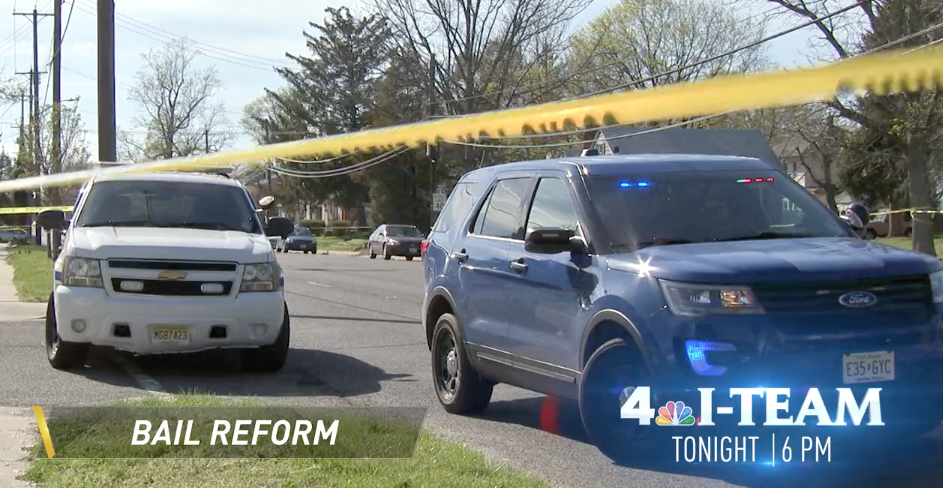
‘Nobody’s Afraid to Commit Crimes’: Cops, Victims Blast Overhaul of NJ Bail System
(by Sarah Wallace of NBC 4 New York – May 18 2017)
A bitter backlash is brewing over bail reform in New Jersey — the four-month-old overhaul of the state system is sparking a firestorm of criticism from front-line cops and victims.
On January 1 of this year, New Jersey overhauled its criminal justice system and virtually eliminated the old cash bail structure, replacing it with one that relies heavily on a mathematical risk assessment formula.
Part 1
The idea was to take money out of the equation for bail. Judges now consider a calculated score designed to determine whether defendants should be released prior to trial. Only those considered at high risk of flight or committing a new crime are detained. Everyone else gets out — some with monitoring conditions.
From January 1 through March 31, 10,193 eligible defendants were processed. Preventive detention was ordered for only 12.4%. Nearly 85% were given pretrial release, some with conditions.
Lawyers who represent indigent clients argue the new system is much more fair.
“It eliminates the inherent discrimination of a monetary bail system. Judges are not locking people up because they’re poor and can’t come up with modest amounts of money,” public defender Joseph Krakora said
But front-line cops in police departments throughout New Jersey say the system is a revolving door disaster. Many have taken to social media to highlight cases of offenders with no bail committing new crimes.
South Plainfield, New Jersey, represents a snapshot of the frustration.
“Nobody’s afraid to commit crimes anymore. They’re not afraid of being arrested, because they know at the end of the day, they’re going to be released. It’s catch and release,” Detective Joe Indano said.
“You’re chasing around the same people over and over again. They’re being released and going back and offending and now you have more people as victims,” Indano said.
Part 2
One case that generated heavy media attention is that of accused serial burglar Dawud Ward, who was released over and over with no bail. He was caught in January by South Plainfield police at the home of Catherine Keller.
“I was totally disgusted that he just kept on being released and two days leter he is doing to someone else’s house and he is doing the same thing,” Keller said. “The system is broken.”
Outraged mother June Rodgers of Millville blames bail reform for the murder of her son. He was shot to death on a street in Vineland in April after a verbal dispute with a man driving a car. Cops arrested career criminal Jules Black, who’d been picked up on a separate gun charge four days before, and released with no bail.
“I say someone needs to come to me and say the system is working when I had to bury my son,” Rodgers said. “What was he doing out on the street? It’s unbelievable.”
Judicial officials reject the idea that dangerous criminals are flooding communities, arguing that people re-offended while out on the old monetary system.
“This is not a new problem,” Krakora said.
Bail bondsmen argue the old system provided accountability and a team approach in securing someone’s release.
“There was a financial incentive to make sure the person showed up for court. It was a guarantee,” bondsman Ron Padron said. “If they ran, we went and got them. You have no one doing that under bail reform.”
The new system has essentially put the private bail bond industry, which employed thousands, out of business.
The state has created a Division of Pretrial Services to monitor defendants. The funds come from court fees. There have been 173 employees hired so far. The projected spending for next fiscal year is expected to be in the range of $36 million to $38 million dollars.
The Office of Administrative Courts was unable to provide any statistics on the number of released defendants who have re-offended since January 1, or the number of those who have failed to appear for scheduled court dates.
NJ Judiciary spokesman Pete McAleer said that under the old system of cash bail, all defendants were given the opportunity to post bail and be released, regardless of the crime alleged or the risk posed to community safety. He said the state is continually looking for ways to improve criminal justice reform.
“There have been productive meetings between the Administrative Office of the Courts, The Attorney General’s Office and the Public Defender’s Office with regard to potential changes in detention recommendations for certain gun charges and charges that may occur while a defendant is on pretrial release,” McAleer said. “We expect to propose changes shortly that will address those issues.”

1 Trackback / Pingback
Comments are closed.